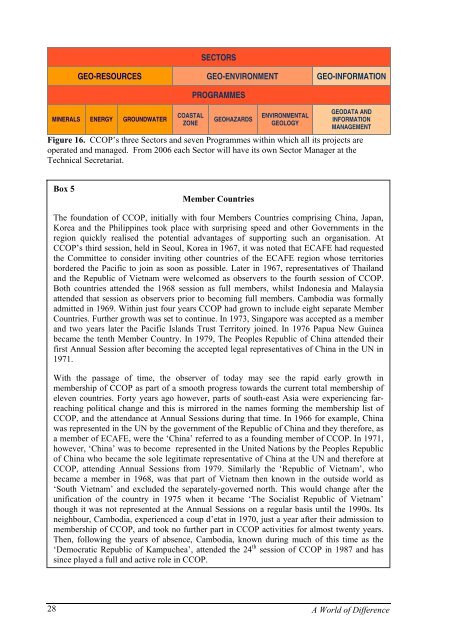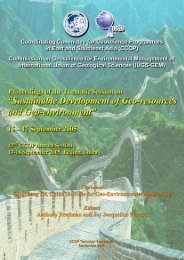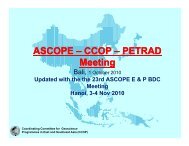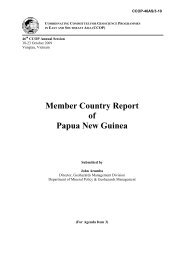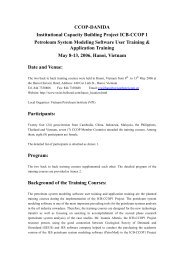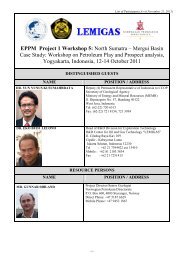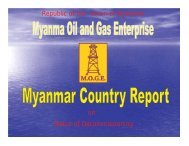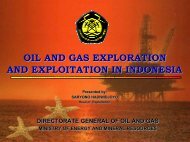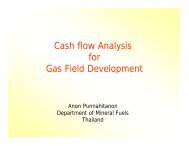Forty Years Of The Coordinating Committee For Geoscience - CCOP
Forty Years Of The Coordinating Committee For Geoscience - CCOP
Forty Years Of The Coordinating Committee For Geoscience - CCOP
Create successful ePaper yourself
Turn your PDF publications into a flip-book with our unique Google optimized e-Paper software.
SECTORS<br />
GEO-RESOURCES GEO-ENVIRONMENT GEO-INFORMATION<br />
MINERALS ENERGY GROUNDWATER<br />
COASTAL<br />
ZONE<br />
PROGRAMMES<br />
GEOHAZARDS<br />
ENVIRONMENTAL<br />
GEOLOGY<br />
GEODATA AND<br />
INFORMATION<br />
MANAGEMENT<br />
Figure 16. <strong>CCOP</strong>’s three Sectors and seven Programmes within which all its projects are<br />
operated and managed. From 2006 each Sector will have its own Sector Manager at the<br />
Technical Secretariat.<br />
Box 5<br />
Member Countries<br />
<strong>The</strong> foundation of <strong>CCOP</strong>, initially with four Members Countries comprising China, Japan,<br />
Korea and the Philippines took place with surprising speed and other Governments in the<br />
region quickly realised the potential advantages of supporting such an organisation. At<br />
<strong>CCOP</strong>’s third session, held in Seoul, Korea in 1967, it was noted that ECAFE had requested<br />
the <strong>Committee</strong> to consider inviting other countries of the ECAFE region whose territories<br />
bordered the Pacific to join as soon as possible. Later in 1967, representatives of Thailand<br />
and the Republic of Vietnam were welcomed as observers to the fourth session of <strong>CCOP</strong>.<br />
Both countries attended the 1968 session as full members, whilst Indonesia and Malaysia<br />
attended that session as observers prior to becoming full members. Cambodia was formally<br />
admitted in 1969. Within just four years <strong>CCOP</strong> had grown to include eight separate Member<br />
Countries. Further growth was set to continue. In 1973, Singapore was accepted as a member<br />
and two years later the Pacific Islands Trust Territory joined. In 1976 Papua New Guinea<br />
became the tenth Member Country. In 1979, <strong>The</strong> Peoples Republic of China attended their<br />
first Annual Session after becoming the accepted legal representatives of China in the UN in<br />
1971.<br />
With the passage of time, the observer of today may see the rapid early growth in<br />
membership of <strong>CCOP</strong> as part of a smooth progress towards the current total membership of<br />
eleven countries. <strong><strong>For</strong>ty</strong> years ago however, parts of south-east Asia were experiencing farreaching<br />
political change and this is mirrored in the names forming the membership list of<br />
<strong>CCOP</strong>, and the attendance at Annual Sessions during that time. In 1966 for example, China<br />
was represented in the UN by the government of the Republic of China and they therefore, as<br />
a member of ECAFE, were the ‘China’ referred to as a founding member of <strong>CCOP</strong>. In 1971,<br />
however, ‘China’ was to become represented in the United Nations by the Peoples Republic<br />
of China who became the sole legitimate representative of China at the UN and therefore at<br />
<strong>CCOP</strong>, attending Annual Sessions from 1979. Similarly the ‘Republic of Vietnam’, who<br />
became a member in 1968, was that part of Vietnam then known in the outside world as<br />
‘South Vietnam’ and excluded the separately-governed north. This would change after the<br />
unification of the country in 1975 when it became ‘<strong>The</strong> Socialist Republic of Vietnam’<br />
though it was not represented at the Annual Sessions on a regular basis until the 1990s. Its<br />
neighbour, Cambodia, experienced a coup d’etat in 1970, just a year after their admission to<br />
membership of <strong>CCOP</strong>, and took no further part in <strong>CCOP</strong> activities for almost twenty years.<br />
<strong>The</strong>n, following the years of absence, Cambodia, known during much of this time as the<br />
‘Democratic Republic of Kampuchea’, attended the 24 th session of <strong>CCOP</strong> in 1987 and has<br />
since played a full and active role in <strong>CCOP</strong>.<br />
28<br />
A World of Difference


